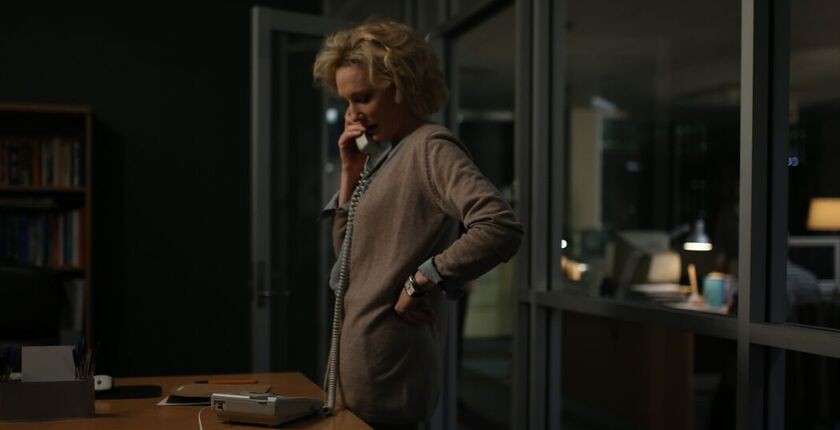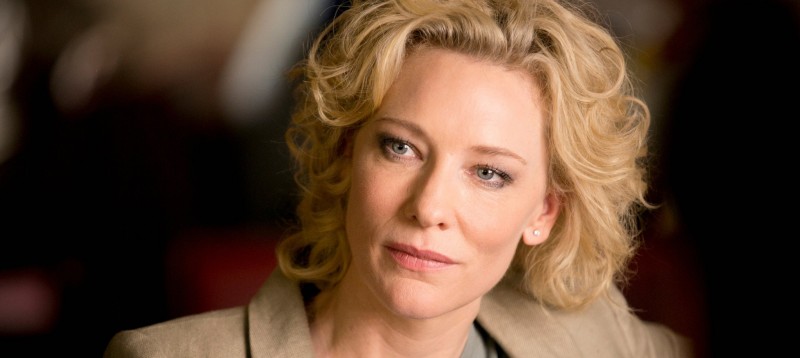The movie, after the first limited released on October 16, opens widely in the U.S. today! Read more reviews below!
“Don’t fight,” a lawyer warns news producer Mary Mapes (Cate Blanchett), on her way into a hearing. She pauses, her mercurial face twisting into incredulity and then straightening back again, repeating the words; you sense that it took Mapes a second or two to grasp that she was being asked, essentially, not to be herself — and was trying, as best she could, to comply.
This moment, which comes late in the fact-based drama “Truth,” is one of many in Blanchett’s performance that just stops you cold; there’s always a movie-within-the-movie playing on her face. And in this case, unfortunately, it’s much more compelling than the larger movie it’s actually in.
But “Truth” is nonetheless mesmerizing, entirely because of Blanchett; this is one of those movie-star performances in which every detail, every gesture feels right. Blanchett’s Mary is whip-smart, a little dramatic, haunted by her past (about which we gradually learn more, particularly in a brief, electric phone call), breezily elegant and always a fighter; just try to take your eyes off her.
via Seattle Times
Mapes, who broke the Abu Ghraib torture and prison abuse scandal story, winning her no fans in certain quarters I’m sure, is under the microscope after the story airs when we first meet her. But seeing her in action in flashbacks, she is an amazingly talented, resourceful powerhouse reporter and producer.
The cast, headed by Blanchett at her best, is spectacular.
via Boston Herald
Everything conspires to bring down the house – the ambition of other news organizations, political pressure, corporate considerations, the abandonment and recanting of key sources, and the mad scramble of all involved to distance themselves from the two players who can neither run nor hide: Mapes and Rather. If there were merits to the story, soon nobody cares, except for them.
All of this would almost be too agonizing to watch, except that Blanchett’s journey from the top to the bottom is spellbinding – we see everything crumbling as through her eyes. When she goes before the men conducting CBS’ internal investigation, we might as well be seeing a scene from the Inquisition. It’s reminiscent of a line from another memorable journalism film, “Five Star Final,” from 1931: “You can always get people interested in the crucifixion of a woman.”
via Houston Chron
As should always be the case but rarely is, top writing here indeed attracts top talent, and while Blanchett is her usual exceptional self — word is she’s even better in “Carol” — Redford (“A Walk in the Woods”), Moss (“Queen of Earth”) and Grace (“American Ultra”) make good use of the opportunity to atone for recent poor decisions.
The real treats, however, are the numerous shared scenes between Blanchett and Redford, who display a collective comfort that suggests “Truth” is their 10th collaboration instead of their first and goes a long way in forming the believable rapport that Mapes and Rather surely exhibited throughout their time as colleagues.
via Citizen Times
One thing that saves Truth from being just a good TV movie is Cate Blanchett, who can pretty much make a movie about paper bags exciting. Her performance as Mapes is touching and often funny. There’s moments where she just wears the anguish on her face. No one in the industry today can break down like Blanchett and command the screen while doing it. It is impossible to look away each time she is on the screen.
Blanchett rides an emotional, professional roller coaster as Mapes. In just hours, the dedicated journalist slips from star to perceived hack. Blanchett passionately throws herself into the role of journalist under fire, but the script lets her down.
via The Advocate
Truth is being heralded as Redford’s time to shine when, in fact, it’s Blanchett who steals this movie. This will come as no surprise to anyone as it would be easy to argue that Cate Blanchett is one the best actresses in Hollywood. Her portrayal of Mary Mapes is done with both passion and a strong will, but with appropriate vulnerability the entire time. Redford portrays Dan Rather traditionally, but it comes off as a flat impression. The credit for any sort of chemistry generated by these two great actors should be given to Cate Blanchett. Even in the midst of Redford’s belabored attempt to become Dan Rather, Blanchett’s screen presence draws not only the audience in but also the actors she’s in the scene with. She creates a real spark with Redford and they seemed to feed off of each other in the film. Her relentless effort in scene after scene elevate the quality of this picture.
Speaking of Mapes, one of the few saving graces of the film is Cate Blanchett’s confident, assured and gripping central performance. In script with this many on-the-nose speeches, Blanchett’s ability to match Vanderbilt’s spit and vinegar in each and every one of them makes them at least slightly more palatable. Blanchett goes full Blue Jasmine in her portrayal of Mapes, all eagle-eyed stares and reptilian pushiness. Unlike Jasmine, however, Mapes is crippled with an unfortunate backstory about her abusive father, which (as in so many movies like this) is meant to explain her hardcore personality.
Nonetheless, one of Truth’s most effective acting moments is Mapes’ pitiful “Daddy, stop” to her father over the phone, a mewling appeal to his domination of her to get him to stop slandering her on Fox News. Blanchett’s complete and utter betrayal of her hardened shell is immediately gripping in the moment, even as the subplot threatens to destroy her character.
Whether Mapes actually got the story right is still open to some debate — but that debate isn’t happening in “Truth.” She’s lionized here — perhaps deservedly, perhaps not — but there’s not much in the way of counternarrative.
That’s a shame, because Blanchett is more than up to the task of presenting an even more complicated character than the one she does here.
Still, the actress is mesmerizing, riveting when she’s losing her temper and equally hypnotic when she’s quiet and letting emotions and horrifying realizations wash over her face.
Blanchett portrays Mapes as a connected, informed and persistent investigative journalist, the kind of bulldog producer who helped “60 Minutes” develop its hard-hitting reputation.
When told that the themes of her stories always seem to revolve around officials who abuse their power, Mapes is blunt: “I don’t like bullies.”
Blanchett is fiery, funny and always a commanding presence as she leads her fellow reporters and researchers (Dennis Quaid, Topher Grace and Elisabeth Moss) down the path to the story: ask the right questions, get the answers, track down the truth.
Every performance is solid, but Blanchett has this chameleon-like quality to disappear into a role, which allows us to completely believe her character. She becomes that character.
We are completely in tune with her thinking and her emotions from the bravado of her top-reporter fame to her vulnerability when it all falls apart. We feel all of her glory, and we experience all of the pain of her downfall.
Her performance is completed by the supporting work of Robert Redford as Rather.
via Tulsa World
 Welcome to Cate Blanchett Fan, your prime resource for all things Cate Blanchett. Here you'll find all the latest news, pictures and information. You may know the Academy Award Winner from movies such as Elizabeth, Blue Jasmine, Carol, The Aviator, Lord of The Rings, Thor: Ragnarok, among many others. We hope you enjoy your stay and have fun!
Welcome to Cate Blanchett Fan, your prime resource for all things Cate Blanchett. Here you'll find all the latest news, pictures and information. You may know the Academy Award Winner from movies such as Elizabeth, Blue Jasmine, Carol, The Aviator, Lord of The Rings, Thor: Ragnarok, among many others. We hope you enjoy your stay and have fun! 



 A Manual for Cleaning Women (202?)
A Manual for Cleaning Women (202?) The Seagull (2025)
The Seagull (2025) Bozo Over Roses (2025)
Bozo Over Roses (2025) Black Bag (2025)
Black Bag (2025)  Father Mother Brother Sister (2025)
Father Mother Brother Sister (2025)  Disclaimer (2024)
Disclaimer (2024)  Rumours (2024)
Rumours (2024)  Borderlands (2024)
Borderlands (2024)  The New Boy (2023)
The New Boy (2023) 











